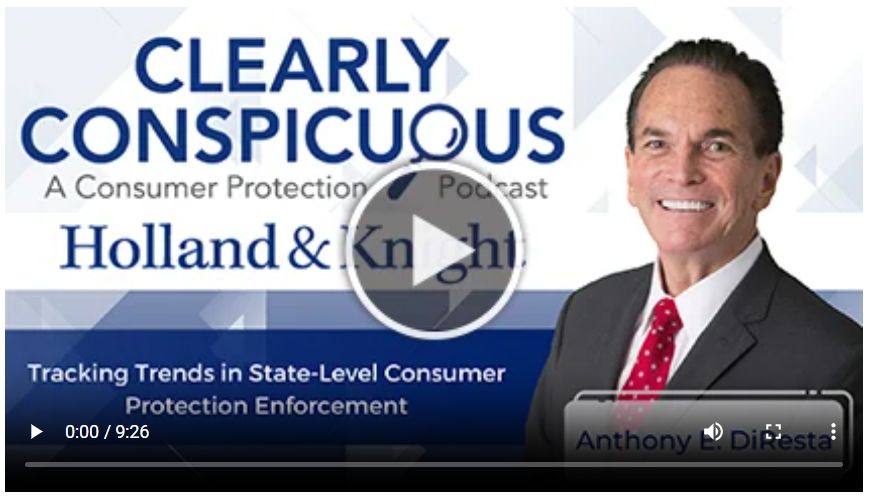- within Strategy topic(s)
In this episode of "Clearly Conspicuous," consumer protection attorney Anthony DiResta reviews recent trends in state-level consumer protection enforcement. He highlights notable actions by state attorneys general (AGs) across the U.S., from Florida's investigations into Roblox and Google's advertising practices, to multistate efforts against illegal electronic cigarettes, multimillion-dollar settlements in Illinois and California, and New Hampshire's lawsuit against Meta for addictive design features that allegedly harm teens. The discussion underscores how states are actively policing deceptive marketing, false advertising and emerging digital issues, often filling gaps left by waning federal enforcement. With investigations intensifying and priorities varying by state, businesses are advised to maintain high compliance standards and pursue transparent, ethical marketing to avoid legal risks and foster consumer trust in an evolving regulatory landscape.
Listen to more episodes of Clearly Conspicuous here.
Podcast Transcript
Anthony DiResta: Good day and welcome to another podcast of Clearly Conspicuous. As we noted in other sessions, our goal is to make you succeed in this environment, make you aware of what's going on and give you practical tips for success. As always, it's a privilege to be with you today.
Today, in following up on our previous session on activities by the state attorneys general, we discuss activities by specific states and sample noteworthy enforcement actions by the states. The goal is to show you that even some of the states you wouldn't expect to be active, are active. So let's begin.
We'll start with Florida. In April of 2025, just a couple of months ago, the Florida Attorney General subpoenaed Roblox, a popular gaming platform among young children, regarding how the platform markets to children, such as age verification requirements, and moderates chat rooms. The purpose of the subpoena was to uncover how Roblox is marketing to children and discover what policies Roblox has implemented, if any, to protect children from predators using the platform. Then, the AG brought an action against Google for monopolizing products and services in online display advertising. The action alleges that Google monopolizes or attempts to monopolize products and services used by advertisers and publishers in online advertising. The complaint alleges that Google engaged in false, misleading and deceptive acts while selling, buying and auctioning online display ads. The main claim is that Google, their deceptive practices demonstrably diminished publishers' abilities to monetize content, increased advertisers' cost to advertise and harmed consumers. Then the Florida AG, also in March 20 of this year, announced an investigation into whether two leading proxy advisors' advice involving the consideration of environmental, social, governance and diversity, equity and inclusion constitutes deceptive or unfair trade practices under Florida law.
Next state is Iowa. The Iowa attorney general, along with 27 other states, asked the Trump Administration to continue combating against illegal e-cigarettes in the U.S. targeting kids. In a letter dated April 10 of this year, 28 attorneys general signed a request urging the Trump Administration to establish a federal multi-agency task force to prioritize curbing the distribution and sale of illegal Chinese e-cigarettes to give Customs and Border Protection the power to seize these illicit tobacco products and to prosecute and increase penalties for violators who help peddle these e-cigarettes.
Then there's the state of Illinois. The Illinois attorney general and the FTC announced a proposed $20 million settlement with Leader Automotive Group. In the lawsuit, the Illinois AG and the FTC alleged that Leader frequently advertised new and used cars online at low prices, designed to entice customers into dealerships, but those prices often ended up being false. Kind of a textbook bait-and-switch scheme that they were alleging.
Next, the state of California. It settled an action against internet and cable carriers for misleading advertising practices for $10.25 million. Then there's the state of North Carolina. A task force led by North Carolina, Indiana and Ohio investigates and are taking legal action against companies responsible for a significant volume of illegal and fraudulent robocall traffic routed into and across the United States. During April of this year, the task force issued a warning notice to caution companies that their actions may violate state and federal consumer protection and telemarketing laws.
Then there's New Hampshire. The New Hampshire attorney general brought a lawsuit against Meta platforms Facebook and Instagram. And the lawsuit accuses Meta of knowingly using addictive design features and algorithms on its platform, including Facebook and Instagram, to encourage compulsive use by teenagers causing harm to their mental health and well-being. And in denying Meta's motion to dismiss, the court concluded that the state had sufficiently alleged violations of the Consumer Protection Act. The court rejected Meta's arguments that the case should be dismissed because its conduct did not occur in New Hampshire or did not engage in trader commerce under the Consumer Protection Act.
So having said all that, here's the key takeaway. Recent trends show that an uptick in state-level enforcement activity shows no signs of slowing. This presents challenges for compliance departments as priorities vary from state to state. Yet there are clear overarching themes that businesses should understand. In just the past couple of years, high-profile state-level actions have resulted in hundreds of millions of dollars in penalties and restitution. These include actions against big tech companies as well as the tobacco industry and pharmaceutical companies related to health products. So we have to just be aware of what's going on with the states. They're also pursuing smaller-scale enforcement actions, targeting hidden fees, misleading pricing and false advertising across industries like travel, auto sales, financial services. State attorneys general are already filling enforcement gaps and taking on novel issues at a local level by policing emerging issues like social media marketing practices, dark patterns and apps, and e-commerce and marketing tactics, targeting vulnerable populations, including children and the elderly.
Looking ahead, even if federal enforcement slows, states will likely continue their aggressive enforcement efforts. Businesses therefore should not view potential federal leniency as a license to lower compliance standards. Instead, businesses should anticipate robust scrutiny at the state level. The past two years' enforcement activities provide a roadmap of priority areas, and businesses can expect continued state-level action to combat deceptive or misleading or false advertising in both traditional media and the ever-evolving social media marketing landscape. In light of these developments, it's imperative for businesses to recognize that the landscape of consumer protection is evolving rapidly. The significant penalties in high-profile cases and the publicity are a stark reminder that deceptive practices will not go unnoticed or be forgotten. As state-level scrutiny intensifies, companies must prioritize ethical and legal marketing and transparent advertising, not only to avoid legal risk, but to build trust with their customers and their consumers.
So ladies and gentlemen, please stay tuned for future programs as we identify and address the key issues and developments and provide strategies for success. I wish you continued success as always and a meaningful day. Thank you.
The content of this article is intended to provide a general guide to the subject matter. Specialist advice should be sought about your specific circumstances.


